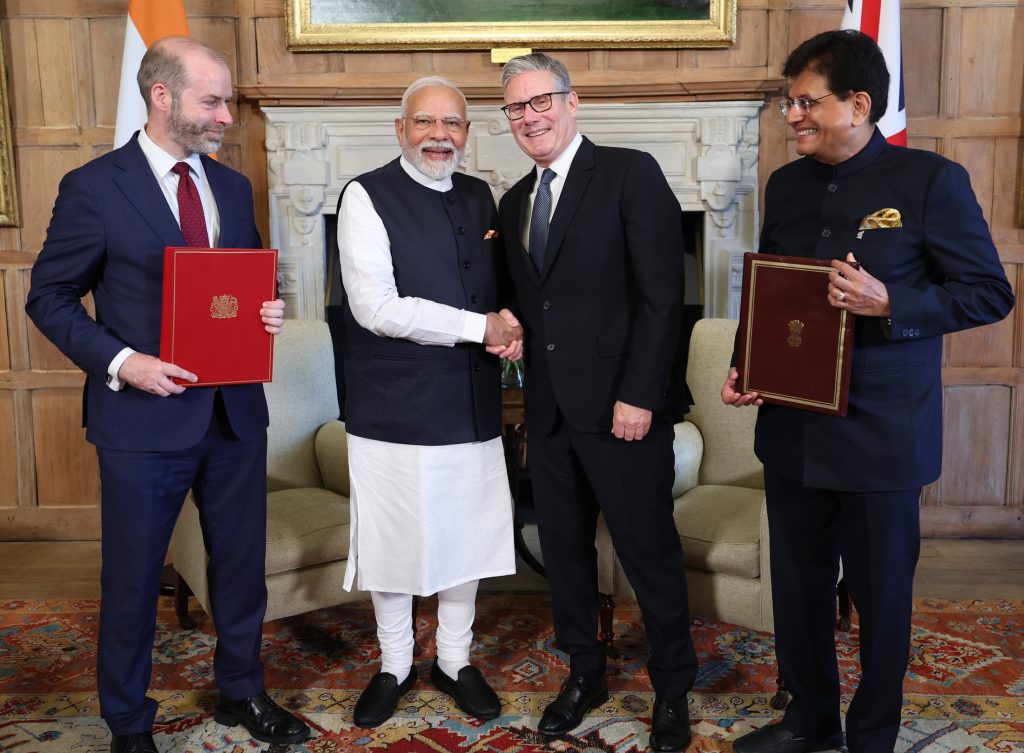INDIA–UK FTA: Key Tariff Commitments and Electronics Sector Implications

PM and the Prime Minister of the United Kingdom, Mr. Keir Starmer witnessing the exchange ceremony of Comprehensive Economic and Trade Agreement (CETA) at London, in England on July 24, 2025.
ICEA did an analysis of India-UK Comprehensive Economic and Trade Agreement (CETA) and its implications for the electronics sector. The India-UK CETA was signed on July 24, 2025.
This historic agreement ushers in a new era in the bilateral economic partnership between India and the United Kingdom. Covering nearly 100% of bilateral trade value, this FTA positions both countries for exponential growth. With a combined GDP of nearly USD 8 trillion and bilateral trade projected to double by 2030, the partnership holds immense strategic and economic significance.
This comprehensive agreement also marks another major milestone in India’s evolving global trade strategy, following key free trade agreements signed with the UAE, the European Free Trade Association (EFTA), and Australia.
ICEA looks forward to working with British companies to build trusted partnerships in the development of emerging technologies ranging from AI and semiconductors to cybersecurity and critical minerals.
Below is the detailed analysis of India-UK FTA:
UK’s Schedule of Commitments to India
- The UK has eliminated import duties effective immediately (Staging Category A) on key electronics-related chapters:
-
- Chapter 84: Machinery and mechanical appliances
- Chapter 85: Electrical machinery and equipment
- Chapter 90: Optical, photographic and medical instruments
- Chapter 91: Clocks and watches
- Chapter 92: Musical instruments
- This ensures full duty-free access from Day 1 for Indian electronics exports to the UK across these product categories.
India’s Schedule of Commitments to the UK
- India has granted immediate duty elimination (EIF – Entry into Force) on critical inputs to support domestic electronics manufacturing:
o Batteries (HS 8506, 8507)
o Television sets (HS 8528)
- However, India has excluded or delayed tariff elimination on several key finished and intermediate electronic products to protect domestic value addition:
| Product Category | HS Code | Treatment | Tariff Elimination Timeline |
| Smartphones | 85171300 | Excluded | No tariff elimination |
| Feature phones | 85171400 | E10 | By Year 10 |
| Smartwatches, Telecom products | 85176290 | Excluded | No tariff elimination |
| Set-top boxes, routers, modems | 85176990 | Excluded | No tariff elimination |
| Aerials and reflectors | 85177100 | Excluded | No tariff elimination |
| PCBA (Printed Circuit Boards) | 85177910 | E10 | By Year 10 |
| Display modules | 8524 | Excluded | No tariff elimination |
| Camera modules | 85258900 | Excluded | No tariff elimination |
| Earphones/headphones | 85183000 | E7 | By Year 7 |
| Loudspeakers and parts | 85182100–85182900 | E5 | By Year 5 |
| Commercial ACs, other ACs & parts | 8415 | E10 | By Year 10 |
| Room Air Conditioners (RACs) | 8415 | E5 | By Year 5 |
| Refrigerators (Commercial) | 8418 | E5 | By Year 5 |
| Refrigerators (Others incl Household) | 8418 | E10 | By Year 10 |
| Washing Machines (over 10 kg) and other parts of Washing Machines | 8450 | EIF | Tariff elimination upon Entry into Force |
| Fully Automatic Washing Machines | 8450 | E10 | By Year 10 |
| 1. Other Machines, With Built-In Centrifugal Drier
2. Other 3. Parts Of Household Type Machines |
8450 | E5 | By Year 5 |
Insights
- The UK’s zero-duty access from Day 1 opens substantial export opportunities for Indian electronics, especially components, medical electronics, and machinery.
- India has strategically protected high-volume domestic segments such as smartphones, smartwatches, and telecom gear by excluding them from tariff elimination.
- Key intermediate inputs like semiconductors and batteries have been liberalized to support India’s manufacturing ambitions
- The phased elimination (E5–E10) on audio products and PCBA provides Indian industry a calibrated window to scale up and become competitive. Overall, the FTA reflects a balanced approach: securing market access in the UK while preserving policy space for sensitive segments in domestic electronics manufacturing.
This agreement is a major win for India’s electronics industry. The immediate elimination of import duties by the UK on key electronics categories—including smartphones, inverters, optical fiber cables, and a wide range of components—offers unprecedented export opportunities. It provides a powerful boost to India’s Make in India for the World vision, and supports our goal of creating a $500 billion electronics manufacturing ecosystem.
Catalyst for India’s Global Capability Centers (GCCs)
The India–UK FTA is poised to be a game-changer for India’s rapidly growing GCC ecosystem. UK-headquartered multinational companies operating technology and business operations hubs in India stand to gain significantly from the agreement’s forward-looking provisions.
- Seamless Talent Mobility: New visa protocols will enable the smoother transfer of senior managers, technical professionals, and intra-corporate assignees between the UK and India. This will enhance integration, on-site collaboration, and global project execution.
- Data & Digital Certainty: Commitments to ensure free and secure cross-border data flows provide the legal and operational clarity essential for GCCs handling global workloads, especially in sectors like IT, fintech, and healthcare analytics.
- Value Chain Upgradation: The agreement encourages UK companies to expand their India-based GCCs beyond transactional services into high-value domains such as research & development, product design, AI, and financial engineering.
- Robust Investment Protection: The inclusion of a strong investment chapter will give UK firms the confidence to scale their India footprint, promoting further capital inflow into India’s knowledge economy.
Transformational Mobility Provisions for Indian Professionals
One of the most significant aspects of the FTA is the chapter on Temporary Movement of Natural Persons (Mode 4)—a long-standing priority for India that has now been addressed meaningfully. These provisions facilitate business travel and professional engagement without altering broader UK immigration policies.
Key Gains for Indian Talent:
- Double Contribution Relief: Through the innovative Double Contribution Convention (DCC), Indian professionals temporarily stationed in the UK will be exempt from paying into the UK social security system, provided they continue contributing in India. This measure alone will save Indian companies and their employees millions of pounds annually.
- Simplified Business Entry: Provisions have been created to streamline the entry of business visitors for activities like establishing companies or attending meetings, with options for extended stay.
- Intra-Corporate Transfers (ICTs): Clear frameworks now exist for the temporary relocation of employees within the same corporate group from India to the UK, easing operational transitions.
- Access for Contractual Service Providers: For the first time, Indian professionals across a broad spectrum—including IT specialists, engineers, architects, yoga instructors, and chefs—will gain contractual access to the UK market. This is a landmark achievement and a direct response to longstanding industry requests.
The India–UK FTA is more than a trade agreement—it is a strategic economic blueprint. By removing market access barriers, ensuring regulatory stability, facilitating cross-border talent flow, and supporting investment, the FTA lays the foundation for a dynamic and resilient partnership between the two nations.
It directly strengthens India’s electronics and services industries, energizes Global Capability Centers, opens up high-value employment pathways for Indian professionals, and fosters greater integration of supply chains, capital, and innovation ecosystems. The agreement signals a clear intent: to build a modern, balanced, and mutually beneficial economic relationship for decades to come.




